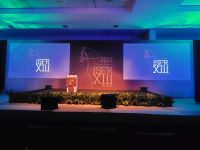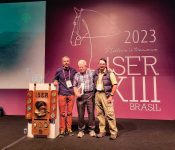
ISER XIII Declared a Success!
 To say that ISER XIII was declared a success is perhaps an understatement! The quadrennial meeting of leading equine reproductive veterinarians, researchers and animal scientists took place July 10-14, 2023 in Foz do Iguaçu, Brazil – admittedly delayed by a year due to COVID – and saw almost 400 participants arriving from all corners of the globe. With around 250 presentations being delivered in oral and poster format, a full list of the topics is far too long to present here, however the Proceedings for this thirteenth International Symposium on Equine Reproduction were published in the Journal of Equine Veterinary Science. We are delighted that our delegate and lead-lecturer Jos Mottershead was invited to attend and will be able to disseminate details of new research about which he heard via appropriate articles on the website, our short courses and posts to the Facebook Group we manage, EquineRepro.
To say that ISER XIII was declared a success is perhaps an understatement! The quadrennial meeting of leading equine reproductive veterinarians, researchers and animal scientists took place July 10-14, 2023 in Foz do Iguaçu, Brazil – admittedly delayed by a year due to COVID – and saw almost 400 participants arriving from all corners of the globe. With around 250 presentations being delivered in oral and poster format, a full list of the topics is far too long to present here, however the Proceedings for this thirteenth International Symposium on Equine Reproduction were published in the Journal of Equine Veterinary Science. We are delighted that our delegate and lead-lecturer Jos Mottershead was invited to attend and will be able to disseminate details of new research about which he heard via appropriate articles on the website, our short courses and posts to the Facebook Group we manage, EquineRepro.
New research was presented for the cellular or chromosomal level, and offered insights into possible causes and resolutions of both mare and stallion infertility, development of new management techniques related to ET and ICSI, epigenetics, and many other facets. Also presented were new procedures and practices which can be immediately used in clinical settings, such as reducing retained endometrial cups, comparisons of different cryoprotectants for use when freezing donkey semen, determining gestational age by measurement of the fetal distal limb using ultrasound, the effects of different forms of estrogens on the mare, and the efficacy of Doxycycline in the late-term pregnant mare with respect to diffusion across the feto-placental unit and safety for the fetus, to name just a few!
The sharing of the new science was one important facet of ISER XIII of course, but of almost equal importance was the making and renewing of friendships and research collaborations. These “private” discussions often go on lead to many new concepts being tried out and other research projects for the future being born. The talk is often heady and intense, but always interesting! The Recanto Cataratas Thermas Resort and Convention Centre was an excellent choice for the symposium, allowing everyone to remain on-site for meals and discussions well into the night or even the early hours of the morning.
A mid-symposium break from the science saw delegates and accompanying persons heading to the astounding Cataratas do Iguaçu – waterfalls which were that day moving around 17,000 cubic meters of water a second – and with the associated spray, the plastic ponchos which were provided were put to good use! A group photo was taken with this impressive scenery as a backdrop.
The last day saw the discussion of an intriguing idea for the future of ISER. The first ISER was held in Cambridge in 1974 and the Symposium has been a free-standing, self-financed meeting ever since. Presented was the possibility of “ISER” moving forward from being the acronym for the symposium to become the acronym for the “International Society for Equine Reproduction”, which might allow multiple interested groups to become involved under one umbrella. The many possible benefits for the future with such an arrangement were presented and discussed. It will be interesting to see this plan move forward into the future. Also related to the future was the announcement for the next meeting – ISER XIV – which will be held in Dublin, Ireland on August 2-7, 2027.
The entire ISER management teams – both the International Committee chaired by Dr. Christine Aurich, and the Local Organizing Committee chaired by Dr. Claudia Barbosa Fernandes, as well as their long-suffering and highly competent Secretary, Dr Julia Kydd – should be – and indeed were by all – praised and commended for putting together a most memorable and enjoyable ISER XIII.




